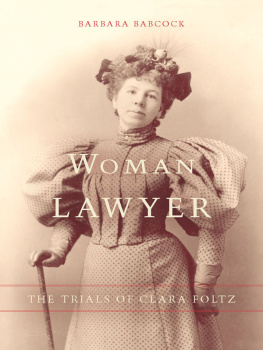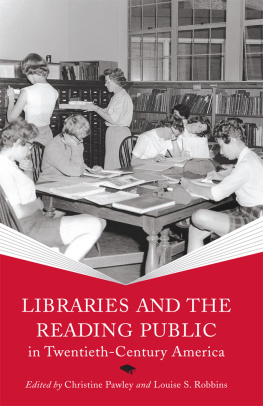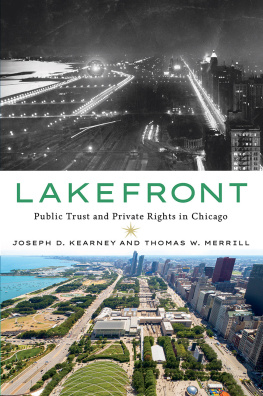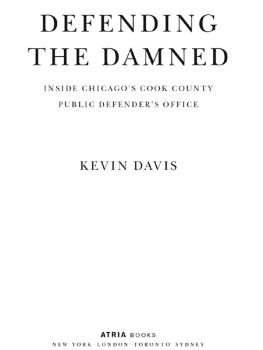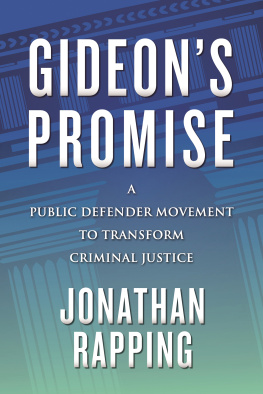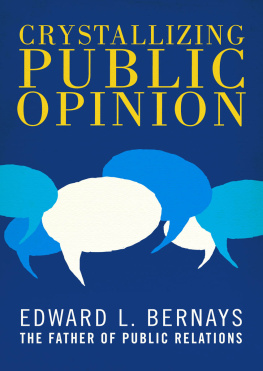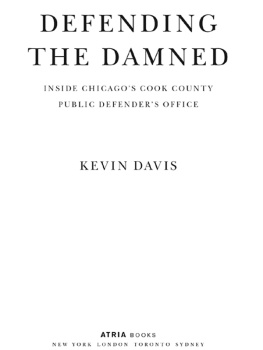Contents
Guide
Pagebreaks of the print version
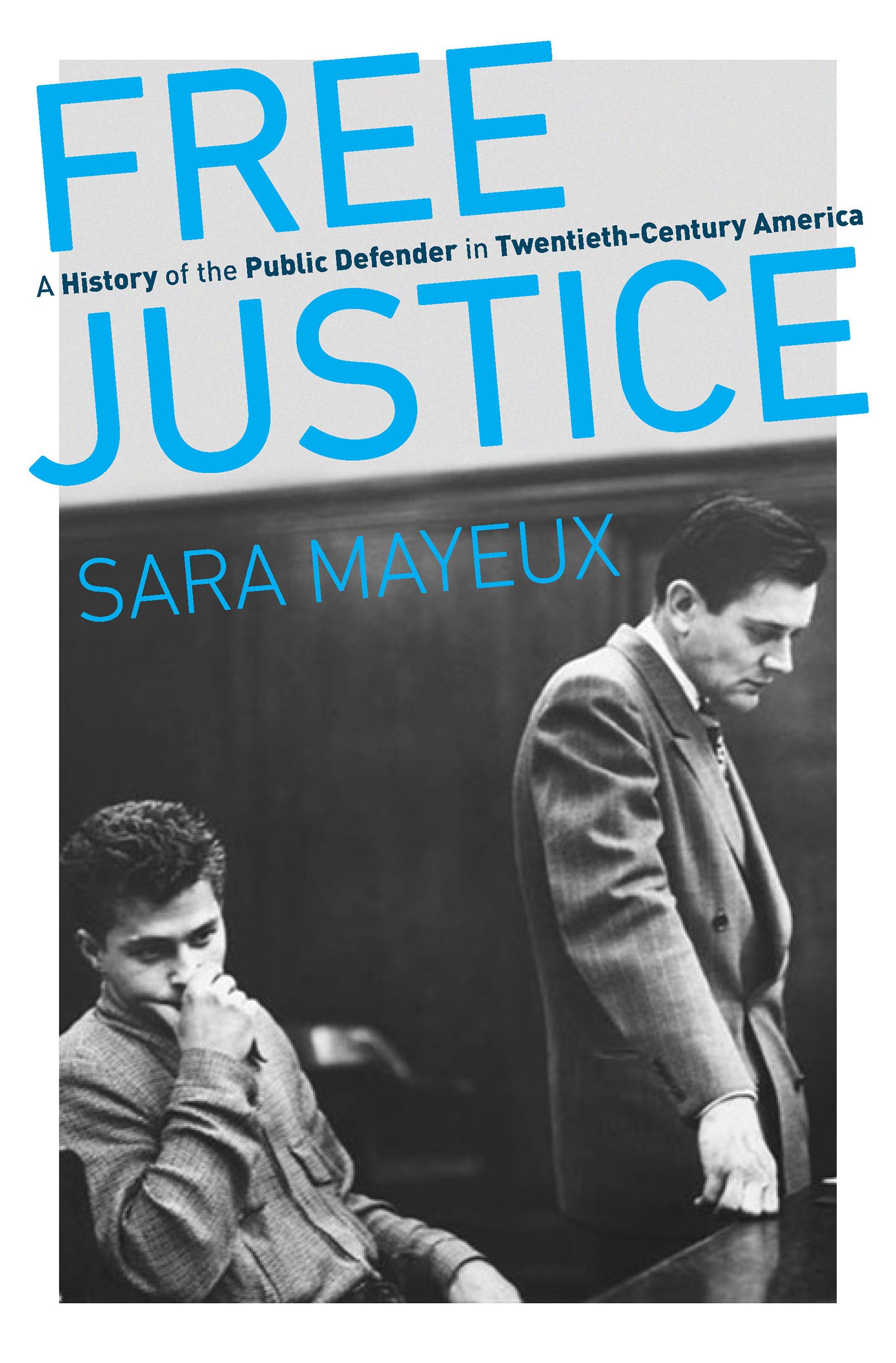
Free Justice
JUSTICE, POWER, AND POLITICS
Coeditors
Heather Ann Thompson
Rhonda Y. Williams
Editorial Advisory Board
Peniel E. Joseph
Daryl Maeda
Barbara Ransby
Vicki L. Ruiz
Marc Stein
The Justice, Power, and Politics series publishes new works in history that explore the myriad struggles for justice, battles for power, and shifts in politics that have shaped the United States over time. Through the lenses of justice, power, and politics, the series seeks to broaden scholarly debates about Americas past as well as to inform public discussions about its future.
More information on the series, including a complete list of books published, is available at http://justicepowerandpolitics.com/.
Free Justice
A History of the Public Defender in Twentieth-Century America
Sara Mayeux
The University of North Carolina Press CHAPEL HILL
This book was published with the assistance of the Thornton H. Brooks Fund of the University of North Carolina Press.
2020 Sara Mayeux
All rights reserved
Set in Merope Basic by Westchester Publishing Services
Manufactured in the United States of America
The University of North Carolina Press has been a member of the Green Press Initiative since 2003.
Library of Congress Cataloging-in-Publication Data
Names: Mayeux, Sara, author.
Title: Free justice : a history of the public defender in twentieth-century America / Sara Mayeux.
Other titles: History of the public defender in twentieth-century America | Justice, power, and politics.
Description: Chapel Hill : University of North Carolina Press, 2020. | Series: Justice, power, and politics | Includes bibliographical references and index.
Identifiers: LCCN 2019052149 | ISBN 9781469656021 (cloth) | ISBN 9781469661650 (pbk.: alk. paper) | ISBN 9781469656038 (ebook)
Subjects: LCSH: Public defendersUnited StatesHistory20th century.
Classification: LCC KF9646 .M39 2020 | DDC 345.73/012630904dc23
LC record available at https://lccn.loc.gov/2019052149
Cover illustration: Dorothea Lange, Pulich in Court, 1957 (A67.137.57136.4). Photonegative, 2.25 2.25 in. The Dorothea Lange Collection, the Oakland Museum of California. Gift of Paul S. Taylor.
Portions of this book were previously published in a different form as What Gideon Did, Columbia Law Review 116, no. 1 (January 2016): 15104.
Contents
Acknowledgments
I first became curious about this subject in 2008, when I was a student intern at the public defenders office for the City and County of San Francisco (established, as I learned that summer, in 1921). Since then, I have met many public defenders around the country. Some are professional acquaintances I have met only in passing, at conferences or similar events; others are former classmates or personal friends. I did not formally conduct interviews or gather oral histories for this book, which relies mainly on archival and published sources. Nevertheless, my thinking on the subject has surely been informed in some deep sense by my conversations with public defenders over the years and my admiration for their work. I am not entirely sure what they might make of the book, but I wish to thank them for teaching me (probably without realizing they were doing so, in most cases) about their unique role within this experiment we call the United States.
I have the great good fortune to teach at Vanderbilt Law School, where most of the work on this book was completed. Dean Chris Guthrie has cultivated a rigorous, collegial, and relatively low-stress environment for teaching and scholarshipa rare combination in academia. I will refrain from listing all of my colleagues here only because of space limitations, but I am grateful to all of them for contributing to this environment as well, and for their feedback, both formal and informal, on my ideas. Chris Slobogin, my faculty mentor, and Dan Sharfstein, our resident expert on legal history and book writing, provided both moral and other forms of support for this project. Spring Miller and Cara Suvall answered queries about legal ethics and have taught me a lot about the current state of the legal profession; Rebecca Allensworth provided clutch feedback on parts of the final draft. I am also grateful to my colleagues over in the history department for their warm welcome and invitations to collaborate.
Vanderbilts Criminal Justice Program underwrote a day-long workshop on an early draft of the book manuscript. For giving generously of their time, insights, and careful attention, I am immensely grateful to the scholars who participated: Vanderbilt colleagues Sarah Igo, Nancy King, Dan Sharfstein, Ganesh Sitaraman, and Kim Welch; and three far-flung colleagues who traveled to Nashville for the occasionAnne Fleming, Joanna Grisinger, and Danny LaChance. It was an honor to spend the day in the company of this excellent group and receive their input. Thanks are also due to associate dean Jim Rossi, program director Chris Slobogin, and program assistant Quenna Stewart for helping to make the workshop happen, and to my erstwhile faculty assistant, Rae Torres, who coordinated logistics. (And I owe a second thanks to Sarah Igo, who kindly obliged when I requested an additional round of last-minute feedback.)
I received my JD and PhD at Stanford University, where an eclectic group of professors and mentors, in both the law school and the history department, encouraged my interests and provided structure for my intellectually meandering tendencies. From my first semester at Stanford Law School, Bob Weisberg sparked my interest in criminal law and indulged my questions about the deeper stories behind the cases we read in class. George Fisher, Elizabeth Joh, Amalia Kessler, Joan Petersilia, and Norm Spaulding, among many other professors on the faculty, provided encouragement and opportunity for research and writing. By luck, Bob Gordon happened to be visiting during my 2L year, and subsequently decided to return to the Stanford faculty full-time. He became an essential and kindly guide as I sought to understand the history of lawyers and legal culture. Finally, I owe immense thanks and many research debts to Barbara Babcock, for both her personal encouragement and her pathbreaking work on Clara Foltz, without which it would have been impossible to know where to begin this project. Although I arrived at Stanford too late to take a class with Barbara, she was unfailingly supportive of my interest in this subject, whether bequeathing me several boxes worth of research materials that she had gathered or recounting her own memories of working as a public defender in the 1960s.
After law school, I had the unparalleled opportunity to clerk for Judge Marsha Berzon, from whom I learned everything I know about the judiciary and most of what I know about law (with apologies to my professors). From Judge Berzon, I also learned not to give up when you see a problem differently than everyone else doesit might be a sign that you are onto something.
Stanfords PhD program in United States history had that most old-fashioned and (I now think) essential of componentsa core curriculumand I am grateful to all of the professors in the history department who shepherded my cohort through our coursework on the grand sweep of American history, including Gordon Chang, Allyson Hobbs, Richard White, and Caroline Winterer. Most of what I read during those seminars is not cited in this books bibliography, but the experience crucially formed my understanding both of the modern United States and of the possibilities of history writing. Estelle Freedman should receive some kind of lifetime achievement award for her research seminar, which made explicit so many essential lessons about research and academia that graduate students are too often left to try and piece together on their own. Jack Rakove was an unfailingly incisive interlocutor and an unparalleled teacher of how to read and think about (and teach about) the Constitution. Finally, Jim Campbell welcomed me over to the history department, encouraged this project, prompted me to think about it on a large scale, and shared a lesson that I only later fully understood, about the importance of finding the right characters.


